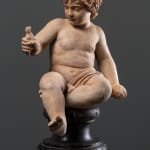YOUNG HERCULES, Italy, 18th Century
terracotta
44 x 25 x 25 cm
17 1/4 x 9 3/4 x 9 3/4 in
17 1/4 x 9 3/4 x 9 3/4 in
Further images
This lovely sculpture represents the young Hercules, seated with his legs crossed, gently holding a bird with his right hand, raised in the air, while supporting his own weight with...
This lovely sculpture represents the young Hercules, seated with his legs crossed, gently holding a bird with his right hand, raised in the air, while supporting his own weight with his left hand.
The artwork refers to the notorious Roman sculpture of the young Hercules killing the snakes sent by Hera, exhibited at the Capitoline Museums in Rome. Academics have identified the young emperor Caracalla or, more recently, Annio Vero, son of the emperor Marcus Aurelius, in the portrait of the sculpture.
During the 16th Century there has been an increasing interest of patrons towards the theme of mythology and several acclaimed Italian sculptors worked on the creation of sculptures and depictions of Roman Gods.
Among them, the distinguished baroque artist Alessandro Algardi worked on the restoration of several ancient sculptures, including the group of Hercules and Hydra at the Musei Capitolini. Algardi is also the author of the seminal bronze sculpture of Infant Hercules with the snakes attributed to the artist by J. Montagu in her major publication from 1985.
While the present terracotta features several common elements with the Roman marble sculpture at the Capitoline museum, the depiction of the child is certainly in line with the style of Algardi and his closer followers, supporting the attribution to a 17th Century artist from the circle of the Roman master.
The artwork refers to the notorious Roman sculpture of the young Hercules killing the snakes sent by Hera, exhibited at the Capitoline Museums in Rome. Academics have identified the young emperor Caracalla or, more recently, Annio Vero, son of the emperor Marcus Aurelius, in the portrait of the sculpture.
During the 16th Century there has been an increasing interest of patrons towards the theme of mythology and several acclaimed Italian sculptors worked on the creation of sculptures and depictions of Roman Gods.
Among them, the distinguished baroque artist Alessandro Algardi worked on the restoration of several ancient sculptures, including the group of Hercules and Hydra at the Musei Capitolini. Algardi is also the author of the seminal bronze sculpture of Infant Hercules with the snakes attributed to the artist by J. Montagu in her major publication from 1985.
While the present terracotta features several common elements with the Roman marble sculpture at the Capitoline museum, the depiction of the child is certainly in line with the style of Algardi and his closer followers, supporting the attribution to a 17th Century artist from the circle of the Roman master.














